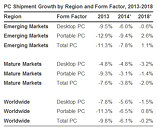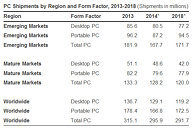- Joined
- Dec 6, 2011
- Messages
- 4,784 (1.01/day)
- Location
- Still on the East Side
Worldwide PC shipments fell by -9.8% in 2013, slightly better than a projected decline of -10.1%, but still the most severe contraction on record, according to the International Data Corporation (IDC) Worldwide Quarterly PC Tracker. Fourth quarter results were slightly better than expected, but the outlook for emerging markets has deteriorated as competition from other devices and economic pressures mount. In mature regions, the fourth quarter was also slightly ahead of expectations, although the improvement seems driven by short-term factors like a slight rise in XP replacements and is not expected to last long.
Overall growth projections for 2014 were lowered by just over 2%, and subsequent years were lowered by less than 1%. However, the changes are enough to keep long-term growth just below zero, and push volumes below 300 million throughout the forecast rather than staying slightly above this level.


Emerging regions were on forecast for the fourth quarter (finishing a dismal year with volume declining by -11.3%), but concerns about the impact of slower economic growth, the culmination of some large projects, and conservative expectations for factors like touch capability, migration off of Windows XP, as well as continued pressure from tablets and smartphones has further depressed expectations going forward.
"Emerging markets used to be a core driver of the PC market, as rising penetration among large populations boosted overall growth," said Loren Loverde, Vice President, Worldwide PC Trackers. "At the moment, however, we're seeing emerging regions more affected by a weak economic environment as well as significant shifts in technology buying priorities. We do expect these regions to recover in the medium term and perform better than mature regions, but growth is expected to stabilize near zero percent, rather than driving increasing volumes as we saw in the past."
"2014 will remain a challenging year for PC vendors in Asia as a cautious economic outlook means consumers will prioritize device purchases. At the same time, tectonic changes in politics will affect commercial spending in some of the major countries, like India, Indonesia, and Thailand, which are due to hold elections this year," said Handoko Andi, Research Manager for Client Devices, IDC Asia/Pacific. "The region is also seeing a void in public sector spending this year after huge education deals seen in India and Malaysia last year failed to materialize."
View at TechPowerUp Main Site
Overall growth projections for 2014 were lowered by just over 2%, and subsequent years were lowered by less than 1%. However, the changes are enough to keep long-term growth just below zero, and push volumes below 300 million throughout the forecast rather than staying slightly above this level.


Emerging regions were on forecast for the fourth quarter (finishing a dismal year with volume declining by -11.3%), but concerns about the impact of slower economic growth, the culmination of some large projects, and conservative expectations for factors like touch capability, migration off of Windows XP, as well as continued pressure from tablets and smartphones has further depressed expectations going forward.
"Emerging markets used to be a core driver of the PC market, as rising penetration among large populations boosted overall growth," said Loren Loverde, Vice President, Worldwide PC Trackers. "At the moment, however, we're seeing emerging regions more affected by a weak economic environment as well as significant shifts in technology buying priorities. We do expect these regions to recover in the medium term and perform better than mature regions, but growth is expected to stabilize near zero percent, rather than driving increasing volumes as we saw in the past."
"2014 will remain a challenging year for PC vendors in Asia as a cautious economic outlook means consumers will prioritize device purchases. At the same time, tectonic changes in politics will affect commercial spending in some of the major countries, like India, Indonesia, and Thailand, which are due to hold elections this year," said Handoko Andi, Research Manager for Client Devices, IDC Asia/Pacific. "The region is also seeing a void in public sector spending this year after huge education deals seen in India and Malaysia last year failed to materialize."
View at TechPowerUp Main Site



